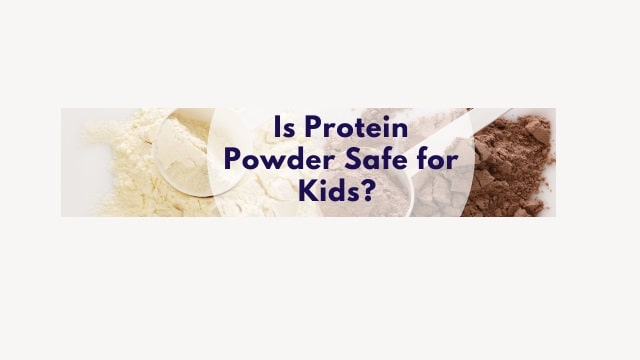Feeding children food containing all the nutrients is no less than a struggle. Especially when the child likes very few things to eat. Even if the child shows fuss in eating, parents do not want their child to lag behind others in terms of height or weight due to lack of nutrition. Therefore, parents wonder whether it will be safe to give protein powder to children in such a situation or not (Protein Powder for Kids). Let us learn further about this topic.
Is Protein Powder Safe for Kids
The answer to the question of whether protein powder is safe for children or not depends entirely on the condition of the child.
If there is protein deficiency in the child’s body, then the pediatrician can ask to give protein to the children.
However, if a child is eating a good variety of foods, it is unusual for him to be deficient in protein. Yes, if the child is suffering from any medical condition in which the body is unable to absorb protein, then the child can take protein powder on the advice of the doctor.
If protein powder is given to the child without necessity or without consulting the doctor, then excess protein in the body can cause harm to the child. Consuming excess protein can also cause obesity in the child later on.
When Protein Supplements can be given to a Child
Protein supplements should never be given to the child voluntarily. Yes, if the child has metabolic problems, then protein powder can be given to the child on the advice of the doctor. Apart from this, if the child is not getting enough protein because he is a vegetarian or vegan, then the specialist can also ask him to give protein to the child.
How much protein is required for a child?
Research published in NCBI states that according to Dietary Reference Intakes, for the growth and development of the child, Based on the classic nitrogen balance technique, children aged 4–13 years and 14–18 years need to take 0.95 and 0.85 g·kg per day, respectively.
| Age | protein |
| 1 to 3 years old | 22 grams |
| 4 to 6 years old | 30 grams |
| 10 to 12 years of age (boy) and 10-12 years of age (girl) – according to weight | 54 grams (boy) and 57 (girl) |
| Teenager – 16 to 18 years old | 63 grams |
| Teenager – 16 to 18 years old | 78 grams |
Source – Indian Dietary Guidelines
According to the American Academy of Pediatrics (AAP), if a child up to age 8 is drinking the recommended amount of cow’s milk per day, he or she is getting most of the protein they need. In fact, every ounce (28.3495 grams) of cow’s milk contains one gram of protein.
If the child does not drink cow’s milk, he can also be given soy milk. It also contains a similar level of protein. Plant-based milk has less protein content.
Side effects of protein powder for children
Community and nutrition expert, Doctor says that excessive consumption of protein powder can cause many problems, such as frequent bowel movements, acne, nausea, thirst, swelling, loss of appetite, fatigue, and headache. Such symptoms may be felt. Whey protein intake can increase plasma urea levels, calcium excretion in urine, and the problem of frequent urination, which can hinder kidney function and make it unhealthy. This puts more strain on the kidneys and can cause kidney stones. Even excessive intake of protein powder can lead to dehydration problems.
If you are giving protein supplements or protein powder to your child arbitrarily, it can have innumerable side effects.
- Child’s weight gain due to sugar and extra calories present in protein powder
- Organ damage
- There is a risk of kidney stones due to excess protein in the body.
- Excess protein can lead to dehydration because excess protein causes the child’s kidneys to work harder.
- High protein also puts pressure on the child’s liver, because its processing produces nitrogen.
Conclusion
You must have understood whether protein powder is necessary for children or not. You should not give just protein, but any powder or supplement to the child without consulting the doctor. You might be surprised to know that many protein powders and shakes are not regulated by the FDA. Meaning they do not need to clearly label the ingredients of protein powder.
